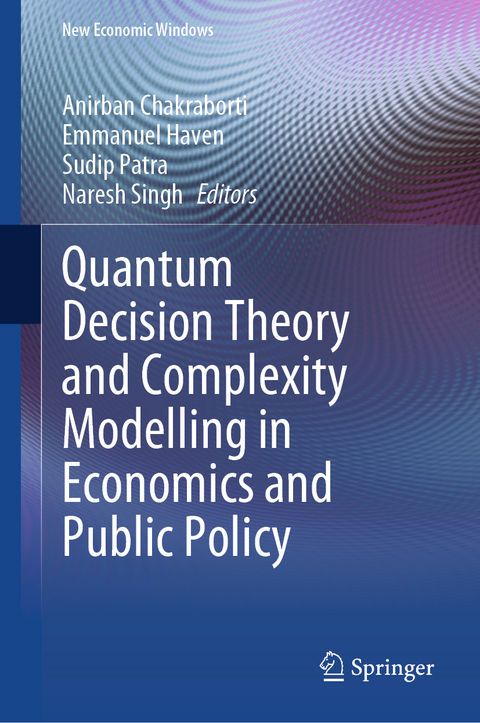
Quantum Decision Theory and Complexity Modelling in Economics and Public Policy
Springer International Publishing (Verlag)
978-3-031-38832-3 (ISBN)
This book is an outcome of the interdisciplinary conference held at OP Jindal Global University (Quantum Decision-making and Complexity modeling, and their possible applications in social sciences economics, finance and public policy). The volume builds upon the emerging fields of Econophysics, Complexity theory and Quantum like modelling in cognition and social sciences, and their plausible applications in economics and public policy. There can be deep linkages between the micro, meso and macro scales at which these paradigms operate. In this data-driven age, greater amounts of information, along with the facility to harvest, sort and process said information, have permitted an expansion of the capability to study a society's various factors to a degree of detail and inclusiveness that has never before been available to researchers. As a result, an increasing number of throughlines is being discovered, revealing heretofore unknown connections between various disciplines and enhancing the study of such societal tropes as finance, language, shared behavior, and many others. As the reader will see, with clearer understanding of the interconnectedness of society's assorted parts comes a clearer understanding of the society as a whole. We have received critical thoughts from noted experts in social and natural sciences to explore possible interconnections. The editors of this book earnestly hope that the critical reviews presented in this volume will stimulate further scholarly interest, but also interest among policy practitioners for the purpose of exploring possibilities for creating a new paradigm for comprehending pressing issues of deep uncertainty and emergence in social dynamics.
lt;p>Anirban Chakraborti is the Dean-Research and Development, BML Munjal University, Gurugram, and Professor at the School of Computational and Integrative Sciences, Jawaharlal Nehru University, New Delhi. He had been a faculty at École Centrale Paris, France, and Banaras Hindu University, India. He obtained a Ph.D. in Physics from Saha Institute of Nuclear Physics, India and then the Habilitation in Physics from the Université Pierre et Marie Curie (Paris VI), France. He has experience working as a scientist at many reputed universities and educational institutions in India, the USA, Europe, and Japan. He was awarded the prestigious Young Scientist Medal by the Indian National Science Academy in 2009 for pioneering work in Econophysics. He has been elected as the Fellow, The World Academy of Sciences (TWAS). He has published fourteen books and edited volumes, and more than eighty-five research and review articles in internationally renowned publishing houses. His main research interests lie in the areas of Econophysics, Sociophysics, Data Science, Complex Systems, Statistical Physics, Quantum Physics and Nanomaterial Science.
Emmanuel Haven has been a pioneer in the emerging paradigm of quantum like modeling in social science. He is the Dr. Alex Faseruk Chair in Financial Management and Director of the Interdisciplinary Ph.D. programme at the Memorial University, Canada. He earned a Bachelor of Arts and Master of Arts in economics from McGill University and a Ph.D. in finance from Concordia University. He is the former head of the finance division at the School of Business, University of Leicester (United Kingdom). His research applies concepts from physics to social science. He has published in social science journals such as the Journal of Mathematical Economics, Economic Theory, the Journal of Mathematical Psychology, the European Journal of Operational Research, the Journal of Economic Dynamics and Control, and the International Review of Financial Analysis, Theory and Decision and Frontiers in Psychology. He has also published in science journals such as Philosophical Transactions of the Royal Society A, Foundations of Physics, the Journal of Mathematical Analysis and Applications, Physica Scripta, the International Journal of Theoretical Physics, Acta Applicandae Mathematicae, Progress in Biophysics and Molecular Biology, Annalen der Physik and other journals. Haven has been the recipient of a 'super star award' from the Students' Union (University of Leicester) for his teaching on several occasions.
Sudip Patra completed his Ph.D. in Financial Economics from Adam Smith Business School, Glasgow University, Scotland. He completed his M.Sc. in finance at Coventry University UK, and also holds an associate fellowship in higher education teaching in the UK. Currently, he is working as an assistant professor in economics at Jindal Global University Business School, Sonipat, India. He is working in the areas of Quantum Decision theory applied to economics and finance, Econophysics and behavioral finance. He has been a visitor researcher at organizations at both Aston University, UK, and IIT Bombay.
Naresh Singh has more than three decades of post Ph.D. international development experience in more than fifty countries. He holds a Ph.D. in Environmental Sciences from the University of West Indies, Mona, and a M.Sc. in Agriculture from the Indian Agricultural Research Institute (IARI), New Delhi, India. Currently, he is the Professor and Professor & Executive Dean, Jindal School of Government and Public Policy, and Director of the Centre for Complexity Economics, Applied Spirituality and Public Policy (CEASP) at O.P. Jindal Global University. He was a Director General and acting Vice President at CIDA; Program Director at the International Institute for Sustainable Development (IISD); Principal Advise
A brief overview of the quantum-like formalism in social science.- Cooperative functioning of unconscious and consciousness from theory of open quantum systems.- Hilbert Space Modelling With Applications in classical optics, human cognition, and game theory.- Remodeling Leadership: Quantum modeling of Wise Leadership.- Quantum financial entanglement: The case of strategic default.- Quantum-like Contextual utility framework: Application in economic theory And wider implications.
| Erscheinungsdatum | 23.09.2023 |
|---|---|
| Reihe/Serie | New Economic Windows |
| Zusatzinfo | VIII, 251 p. 39 illus., 30 illus. in color. |
| Verlagsort | Cham |
| Sprache | englisch |
| Maße | 155 x 235 mm |
| Gewicht | 547 g |
| Themenwelt | Wirtschaft ► Allgemeines / Lexika |
| Wirtschaft ► Betriebswirtschaft / Management | |
| Schlagworte | Cognitive Sciences • Complexity theory • Econophysics • Public Policy Making • Quantum Decision Theory |
| ISBN-10 | 3-031-38832-1 / 3031388321 |
| ISBN-13 | 978-3-031-38832-3 / 9783031388323 |
| Zustand | Neuware |
| Informationen gemäß Produktsicherheitsverordnung (GPSR) | |
| Haben Sie eine Frage zum Produkt? |
aus dem Bereich


